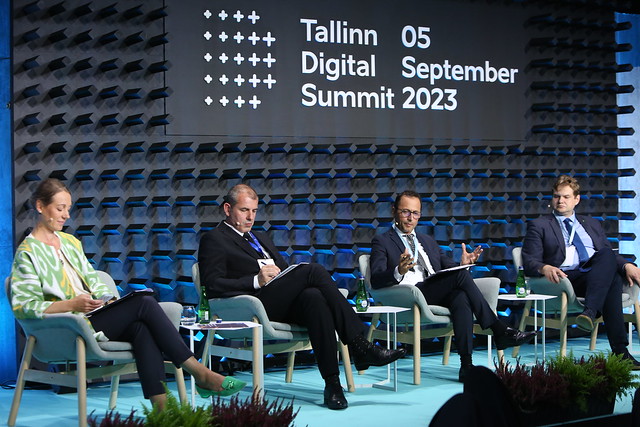
Western Balkan digital security focus at Tallinn Digital Summit
Western Balkan digital security panel, organized by e-Governance Academy (eGA) at Tallinn Digital Summit (TDS) opened up a discussion around cyber resilience and ways to further develop an organized approach to cybersecurity in the region. The panel can be viewed here.
In the panel prelude, Peter Wagner, Director of European Service for Foreign Policy Instruments (FPI) highlighted the importance of hands-on work and trustworthy partnerships that projects such as Cybersecurity Rapid Response for Albania, Montenegro and North Macedonia help to bring about. He noted that cybersecurity goes hand-in-hand with misinformation threats and tackling these challenges are vital in this interconnected world.
Marash Dukaj, Minister of Public Administration of Montenegro set the scene in his keynote, by talking about the steps Montenegro has taken in order to create a resilient cyberspace, such as changing the regulatory framework and drafting a new law on cybersecurity. Montenegro has also set up a regional cybersecurity centre in Podgorica to enhance regional and international cooperation. “Considering the challenges we face, international cooperation is a must,” Mr. Dukaj asserted in his speech.
The panel, moderated by Merle Maigre, head of Cybersecurity Competence centre in eGA, involved Dušan Polović, Head of Cybersecurity Department of Montenegro, Prof. Igli Tafa, General Director of the National Authority for Electronic Certification and Cyber Security of Albania and Dr. Priit Vinkel, Former Head of Estonian State Electoral Office and eGA Senior Expert, who together discussed various response strategies to cyberattacks in Albania and Montenegro and ways of securing elections in the digital era.
Prof. Igli Tafa shared the experience of Albania in dealing with an unprecedented wave of cyberattacks linked to national foreign policy. He said that Albania’s response to these attacks involved diplomatic actions and measures to address vulnerabilities but also operational and technical plans for swift response to threats.
Montenegro has also suffered numerous cyberattacks. “Every election in Montenegro has been accompanied by cyberattacks and hybrid threats in the past,” noted Dušan Polović. Through the Cybersecurity Rapid Response project, implemented by eGA, Montenegro benefited from experts specifically focused on cyber issues during election campaigns. According to Polović, sharing experiences with these experts was extremely important, as it significantly helped improve resilience.
Priit Vinkel emphasized that digital elections rest on three pillars: coordination and cooperation, human resources and technology. He noted that awareness raising and maintaining cyber hygiene are vital among the general public and public officials. In addition to the government’s role, political parties and candidates also play a crucial role in ensuring cybersecurity during election campaigns, as they need to be aware of risks and take necessary actions. More recommendations were published in the Montenegro Elections Cybersecurity Report co-authored by Priit Vinkel and Maili Kark.
Tallinn Digital Summit is a flagship event bringing together top politicians, opinion leaders, entrepreneurs, academia and the technology community to draw attention to the importance of digital change and address its impact on economies, societies, people and countries. The 6th annual summit brought together nearly 500 guets from 70 countries.
The panel discussion was organized under the Cybersecurity Rapid Response for Albania, Montenegro and North Macedonia project, funded by the European Union. The objective of the 17-month project, with a budget of 2.6 million euros, which started in August 2022, was to contribute to the enhancement of cyber resilience of Albania, North Macedonia, and Montenegro in compliance with EU acquis and best practice by strengthening governance structures and improving cybersecurity incident and risk management. The project was implemented by e-Governance Academy.

















